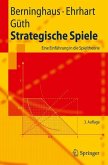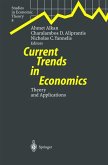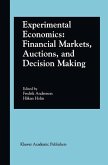This experimental study examines both spontaneous and strategically planned behavior of boundedly rational sub- jects in a dynamic duopoly situation. Spontaneous behavior is observed in game-playing experiments where students from the University of Bonn have played the dynamic duopoly game by direct interaction via computer terminals. Strategically planned behavior isrevealed in strategies developed by forty-five academic economists from 12 countries. These strategies are played against each other in computer simulations. The most striking observation in both types of examination is the coexistence of cooperation and competition. Short-run monopoly pricing emerges as the prevailing mode of cooperation in the planned strategies. However, the most successful strategies turn out to be moderately competitive. An evolutionary tournament suggests a long-run coexistence of competition and cooperation.
This report portrays the results of experimental research on dynamic duopoly markets with demand inertia. Two methods of experimentation are studied: game-playing experiments where subjects interact spontaneously via computer terminals, and computer tournaments between strategies designed by subjects. The principal aim of this study is the understanding of boundedly rational decision making in the dynamic duopoly situation. 1. 1 Motivation The experiments examine a multistage duopoly game where prices in each period are the only decision variables. Sales depend on current prices and also on past sales (demand inertia). Applying the game-theoretic concept of subgame perfect equilibrium, the game is solved by backward induction. The result is a uniquely determined system of decision rules. However, we can hardly expect that human beings behave according to the equilibrium strategy of this game. It is unlikely that subjects are able to compute the equilibrium. And even if a subject is able to compute it, he might not make use of this knowledge. Only if he expects the others to behave according to the equilibrium, it is optimal for him to play the equilibrium strategy. We have evidence from several earlier experimental studies on oligopoly markets that, even in less complex oligopoly situations where the equilibrium solutions are very easy to compute, human behavior often is different from what is prescribed by normative theory. ! Normative theory is based on the concept of ideal rationality. However, human capabilities impose cognitive limits on rationality.
Hinweis: Dieser Artikel kann nur an eine deutsche Lieferadresse ausgeliefert werden.
This report portrays the results of experimental research on dynamic duopoly markets with demand inertia. Two methods of experimentation are studied: game-playing experiments where subjects interact spontaneously via computer terminals, and computer tournaments between strategies designed by subjects. The principal aim of this study is the understanding of boundedly rational decision making in the dynamic duopoly situation. 1. 1 Motivation The experiments examine a multistage duopoly game where prices in each period are the only decision variables. Sales depend on current prices and also on past sales (demand inertia). Applying the game-theoretic concept of subgame perfect equilibrium, the game is solved by backward induction. The result is a uniquely determined system of decision rules. However, we can hardly expect that human beings behave according to the equilibrium strategy of this game. It is unlikely that subjects are able to compute the equilibrium. And even if a subject is able to compute it, he might not make use of this knowledge. Only if he expects the others to behave according to the equilibrium, it is optimal for him to play the equilibrium strategy. We have evidence from several earlier experimental studies on oligopoly markets that, even in less complex oligopoly situations where the equilibrium solutions are very easy to compute, human behavior often is different from what is prescribed by normative theory. ! Normative theory is based on the concept of ideal rationality. However, human capabilities impose cognitive limits on rationality.
Hinweis: Dieser Artikel kann nur an eine deutsche Lieferadresse ausgeliefert werden.








